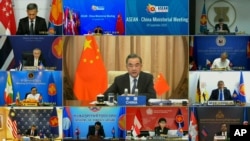ຈີນຈະໃຫ້ການຕ້ອນຮັບລັດຖະມົນຕີຕ່າງປະເທດຈາກ 10 ປະເທດເອເຊຍຕາເວັນອອກສຽງໃຕ້ ໃນອາທິດນີ້ ທ້າມກາງການແຂ່ງຂັນກັນລະຫວ່າງປັກກິ່ງແລະ ວໍຊິງຕັນເພື່ອສ້າງອິດທິພົນຢູ່ໃນຂົງເຂດນັ້ນ, ອີງຕາມລາຍງານ ຂອງອົງການຂ່າວເອພີ (AP).
ສື່ມວນຊົນຂອງທາງການຈີນກ່າວວ່າ ກອງປະຊຸມໃນວັນອັງຄານຈະມາເຖິງນີ້ ຢູ່ນະຄອນໃຫຍ່ຈອງຈິງ (Chongqing), ທາງຕາເວັນຕົກສຽງໃຕ້ຂອງປະເທດຈະກວາມເອົາບັນຫາຕ່າງໆ ນັບແຕ່ການຟື້ນຟູການທ່ອງທ່ຽວ ແລະການແລກປ່ຽນທາງເສດຖະກິດອື່ນໆ ທີ່ຖືກທໍາລາຍໂດຍພະຍາດໂຄວິດ-19 ຈົນເຖິງການດໍາເນີນຄວາມພະຍາຍາມທີ່ມີການປະສານງານຫຼາຍຂຶ້ນ ໃນການຕໍ່ສູ້ກັບການແຜ່ລະບາດຂອງພະຍາດນີ້ ແລະຄວາມເປັນໄປໄດ້ທີ່ຈະສ້າງປັສປອດ ຫລືໜັງສືເດີນທາງທີ່ມີໃບຢັ້ງຢືນການສັກຢາວັກຊີນເພື່ອອະນຸຍາດໃຫ້ມີການເດີນ ທາງສະດວກຂຶ້ນ ລະຫວ່າງບັນດາປະເທດເຫລົ່ານີ້.
ລັດຖະມົນຕີກະຊວງການຕ່າງປະເທດຈີນ, ທ່ານຫວາງ ຢີ (Wang Yi) ຍັງຄາດຫວັງອີກວ່າ ຈະມີການພົບປະແບບສອງຝ່າຍກັບຄູ່ຕຳແໜ່ງຂອງທ່ານຈາກແຕ່ລະປະເທດ ໃນເວລານອກກອງປະຊຸມ.
ປັກກິ່ງກຳລັງສ້າງອິດທິພົນ ຕໍ່ 10 ປະເທດທີ່ເປັນສະມາຊິກຂອງສະມາຄົມບັນ ດາປະເທດຕາເວັນອອກສຽງໃຕ້, ເຖິງແມ່ນວ່າຈະມີຄວາມຂັດແຍ້ງກັນກັບບາງປະເທດກ່ຽວກັບການອ້າງເອົາກຳມະສິດ ໃນດິນແດນຢູ່ໃນທະເລຈີນໃຕ້ກໍຕາມ. ຟີລິບປິນໄດ້ຮ້ອງທຸກຫຼາຍຄັ້ງກ່ຽວກັບການມີກໍາປັ່ນຈີນ ຈອດຢູ່ບ່ອນທີ່ເປັນໂຂດຫີນທີ່ຕົນອ້າງເອົາກໍາມະສິດນັ້ນ ແລະມາເລເຊຍໃນອາທິດຜ່ານມາກໍໄດ້ປະທ້ວງ ກ່ຽວກັບການບຸກລຸກຂອງເຮືອບິນທະຫານຈີນ 16 ລຳ ເຂົ້າໄປໃນເຂດໜ່ານຟ້າຂອງຕົນ, ໂດຍເອີ້ນເຫດການດັ່ງກ່າວວ່າ “ເປັນໄພຂົ່ມຂູ່ທີ່ຮ້າຍແຮງຕໍ່ອະທິປະໄຕຂອງຊາດແລະຄວາມປອດໄພໃນການບິນ.”
ແຕ່ຢ່າງໃດກໍ່ຕາມ, ເສດຖະກິດ ແລະການທູດຂອງຈີນໄດ້ຊ່ວຍແກ້ໄຂຄວາມກັງ ວົນດັ່ງກ່າວ, ໃນຂະນະທີ່ກຸ່ມປະເທດນີ້ ຍັງບໍ່ສາມາດສ້າງຈຸດຢືນ ທີ່ເປັນເອກະພາບກັນໄດ້ໃນການປະເຊີນໜ້າກັບການຄັດຄ້ານຈາກພັນທະມິດຂອງຈີນຢູ່ພາຍໃນກຸ່ມ, ຕົ້ນຕໍແມ່ນກຳປູເຈຍ.
ໂຄສົກກະຊວງການຕ່າງປະເທດຈີນ, ທ່ານຫວາງ ເວັນບິນ (Wang Wenbin) ກ່າວໃນວັນອາທິດວານນີ້ ໃນເວລາປະກາດກ່ຽວກັບກອງປະຊຸມນັ້ນວ່າ “ໃນສາມທົດສະວັດຜ່ານມາ ການຮ່ວມມືລະຫວ່າງຈີນກັບອາຊຽນໄດ້ຂະຫຍາຍຕົວຢ່າງກ້າວກະໂດດຂັ້ນ, ກາຍເປັນຕົວຢ່າງທີ່ປະສົບຜົນສຳເລັດແລະມີພະລັງທີ່ສຸດໃນດ້ານການຮ່ວມມືຢູ່ໃນຂົງເຂດເອເຊຍ-ປາຊີຟິກ.”
ທ່ານຫວາງກ່າວອີກວ່າ “ຄວາມຈິງທີ່ວ່າ ທັງສອງຝ່າຍໄດ້ຕົກລົງທີ່ຈະຈັດກອງປະຊຸມລັດຖະມົນຕີຕ່າງປະເທດພິເສດ ແບບຕໍ່ໜ້າເຖິງແມ່ນວ່າສະຖານະການຂອງພະຍາດໂຄວິດ-19 ຍັງມີຢູ່ນີ້ ສະແດງໃຫ້ເຫັນວ່າ ປະເທດຕ່າງໆ ໃຫ້ຄວາມສຳຄັນ ແລະມີຄວາມຄາດຫວັງສູງຕໍ່ການພົວພັນລະຫວ່າງຈີນກັບອາຊຽນພາຍໃຕ້ສະຖານະການໃໝ່ຄືແນວໃດ.”
ສະຫະລັດ ທີ່ຮັກສາການມີໜ້າແລະການເດີນເຮືອຢ່າງສະໝໍ່າສະເໝີຢູ່ທະເລຈີນໃຕ້ ແລະມີການພົວພັນຢ່າງແໜ້ນແຟ້ນ ກັບຂົງເຂດນັ້ນ ໄດ້ສະແດງຄວາມເປັນຫ່ວງຕໍ່ການມີໜ້າເພີ່ມຫລາຍຂຶ້ນນັບມື້ຂອງຈີນ, ໂດຍສະເພາະແມ່ນຜົນກະທົບຕໍ່ຄວາມໝັ້ນຄົງແລະອິດທິພົນທາງການເມືອງຂອງປັກກິ່ງຕໍ່ບັນດາປະເທດທີ່ມີປະ ຊາທິປະໄຕທີ່ອ່ອນແອນັ້ນ.
ອ່ານຂ່າວນີ້ເພີ້ມເປັນພາສາອັງກິດຢູ່ຂ້າງລຸມນີ້:
China is hosting foreign ministers from 10 Southeast Asian nations this week amid heightened competition between Beijing and Washington for influence in the region.
Chinese state media said the meeting Tuesday in the southwestern megacity of Chongqing will cover issues from restoring tourism and other economic exchanges battered by COVID-19, to more coordinated efforts in fighting the pandemic and the feasibility of creating a vaccine passport to allow freer travel among them.
Chinese Foreign Minister Wang Yi is also expected to meet separately with each of his counterparts on the sidelines of the conference.
Beijing has been building influence with the 10 countries that make up the Association of Southeast Asian Nations, despite frictions with some of them over rival territorial claims in South China Sea. The Philippines has complained repeatedly over the presence of Chinese boats moored at a reef that it claims and Malaysia last week protested over an intrusion by 16 Chinese military aircraft into its airspace, calling the incident a “serious threat to national sovereignty and flight safety.”
Chinese economic and diplomatic heft have helped override such concerns, however, while the bloc has been unable to form a unified stand in the face of opposition from Chinese allies within, primarily Cambodia.
“Over the past three decades, China-ASEAN cooperation has grown in leaps and bounds, becoming the most successful and dynamic example of cooperation in the Asia-Pacific region,” Chinese Foreign Ministry spokesperson Wang Wenbin said on Sunday in announcing the meeting.
“The fact that the two sides agreed to hold a face-to-face special foreign ministers' meeting despite the ongoing grim COVID-19 situation reflects how countries attach great importance to and hold high expectations of China-ASEAN relations under the new circumstances,” Wang said.
The U.S., which maintains an active naval presence in the South China Sea and strong relations with the region, has expressed concerns over China's growing presence, particularly its impact on security and Beijing's political influence over fragile democracies.
In a meeting with Cambodian Prime Minister Hun Sen on Tuesday, U.S. Deputy Secretary of State Wendy Sherman focused on China's construction of new facilities at Ream Naval Base and urged Cambodia's leadership to maintain an independent and balanced foreign policy, “in the best interests of the Cambodian people.”
China, meanwhile, calls the U.S. naval presence the biggest threat to security in the region, particularly its insistence on sailing close to Chinese-held features in what are termed freedom of navigation operations.
Beijing also strongly objects to strengthened relations between the U.S. and Taiwan, the self-governing island claimed by China, which threatens to use military force to bring it under its control.
Washington sent a strong message of support on Sunday when three senators flew to Taipei on an Air Force transport plane to announce the U.S. will give Taiwan 750,000 doses of COVID-19 vaccine after the island complained that China is hindering its efforts to secure vaccines as it battles an outbreak.
Democratic Sen. Tammy Duckworth of Illinois, who made a three-hour stop in Taiwan with fellow Democrat Christopher Coons of Delaware and Republican Dan Sullivan of Alaska, said their visit underscores bipartisan U.S. backing for the democratic island.




